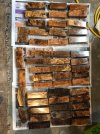I have some really nice curly maple that I am planning on using for a handle. I've had issues with wood swelling in the past, so I am looking to stabilize it the cheapest way possible. I know roasting wood stabilizes it so that it doesn't warp/ swell. Has anyone tried doing this at home? It usually happens in a vacuum, but I thought wrapping it in a couple layers of foil might keep the oxygen away from it enough.
Any suggestions for cheap stabilization are welcome
Any suggestions for cheap stabilization are welcome

